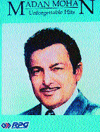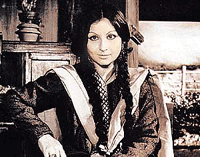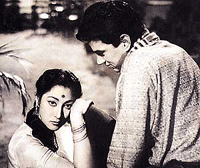This Monday, June 25th was ghazal samrat Madan Mohan ji's 83th birth anniversary He was born on this day in 1924. On this occasion a book was released on him, written by Vishwas Nerurkar, who wrore biographies of many golden era composers. Here is the news.
| book released on Late Madan Mohan | |||
| Monday, June 25, 2007 17:17 [IST] IndiaFM |
| ||
| A book on the legendary composer, Late Madan Mohan, was released in Mumbai on Friday, 22nd June. The book was released by celebrated producer & director, Yash Chopra, at a musical show held in memory of the late composer. Yash Chopra, on the occasion said, "I had always been an admirer of Madanji's music but did not get the opportunity to work with him in his lifetime. It is indeed miraculous and historic that for my film Veer-Zaara, thirty years after his demise, his unused melodies formed the soundtrack of my film. It was almost as if he had left behind a tune for every conceivable situation in my film." The function featured thirty songs from the popular repertoire of Madan Mohan, rendered by wonderful, young talented singers. The immortal hits sung included Aapki Nazaron Ne Samjha, Hum Pyaar Mein Jalnewalon Ko, Lag Ja Gale, Tum Jo Mil Gayo Ho, Kaun Aaya Mere Man Ke Dware, Phir Wohi Shaam, Jhumka Gira Re, Dil Dhoondhta Hai and various others including Tere Liye from Veer-Zaara. Almost 40 musicians formed the orchestra that featured only acoustic instruments and no electronics - to recreate the sound of the Golden Era of music. The function was attended by all the members of the Madan Mohan family. The book entitled, "Ultimate Melodies", is written and compiled by Vishwas Nerurkar and Bishwanath Chatterjee. It features write-ups on the legend by Yash Chopra, Gulzar, Manna Dey, Sadhana, Bhupinder Singh, and Madan Mohan's family members. The book also documents various facets of Madan Mohan's life, and all the songs and films for which he composed. It is a journey through his twenty-five year-old career, which was cut short by his untimely demise at the age of 51. On the occasion, Madan Mohan's elder son, Sanjeev Kohli said, "It is our privilege that thirty-two years after the demise of our father, he is being honoured by his fans through this book that will further perpetuate his memory and melodies. With Veer-Zaara, the younger generation got more familiar with his compositions, and through this book his admirers will learn so much more about their favourite composer." Madan Mohan composed for over a 100 films during his illustrious career, and won several posthumous awards for the music in Yash Chopra's film, Veer-Zaara, including the coveted IIFA Award. |






























